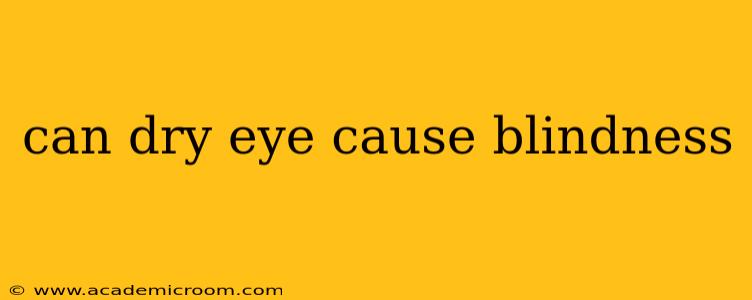Dry eye syndrome, a common condition affecting millions, is characterized by insufficient lubrication and moisture on the surface of the eye. While it's rarely the direct cause of blindness, persistent and severe dry eye can lead to complications that potentially impair vision, even significantly. This article explores the connection between dry eye and vision loss, addressing common concerns and offering preventative measures.
What is Dry Eye Syndrome?
Dry eye syndrome occurs when your tears don't adequately lubricate your eyes. This can stem from various factors, including aging, hormonal changes (like menopause), certain medications (antihistamines, antidepressants), environmental factors (wind, dry air, smoke), and underlying conditions like Sjögren's syndrome or blepharitis. Symptoms can range from mild discomfort to intense pain and blurry vision.
Can Dry Eye Lead to Blindness? The Relationship Explained
Dry eye itself doesn't directly cause blindness. However, the chronic inflammation and damage to the cornea (the clear front part of your eye) associated with severe, untreated dry eye can lead to vision problems. These problems may include:
- Corneal Ulcers: Prolonged dryness can create micro-abrasions on the cornea, making it vulnerable to bacterial or fungal infections, leading to ulcers. Untreated corneal ulcers can cause scarring, clouding, and even vision loss.
- Corneal Damage: Constant dryness can gradually damage the delicate corneal surface. This damage can manifest as irregularities, thinning, or scarring, negatively impacting vision.
- Increased Risk of Eye Infections: A dry eye environment is more susceptible to infections, potentially resulting in conditions that impact sight.
It's crucial to understand that blindness due to dry eye is extremely rare. The vast majority of individuals with dry eye experience manageable symptoms. However, neglecting the condition and failing to address it properly can significantly elevate the risk of these vision-threatening complications.
How is Dry Eye Diagnosed and Treated?
Diagnosis involves a comprehensive eye exam, often including tests to measure tear production and quality. Treatment plans are tailored to the individual's needs and severity but may include:
- Artificial Tears: Frequent application of lubricating eye drops can provide relief.
- Prescription Eye Drops: For more severe cases, medications like cyclosporine or lifitegrast may be prescribed to reduce inflammation.
- Punctal Plugs: Small plugs inserted into the tear ducts can help retain moisture in the eye.
- Warm Compresses: Applying warm compresses helps melt hardened oil glands, improving tear quality.
- Lifestyle Changes: Modifying environmental factors (humidifiers, sunglasses) and addressing underlying conditions can play a crucial role.
What are the Long-Term Effects of Untreated Dry Eye?
Long-term untreated dry eye can lead to persistent discomfort, vision impairment from corneal damage, and an increased risk of infections. The severity of these long-term effects varies greatly, depending on the individual and the level of care received.
Can Dry Eye Be Prevented?
While some factors causing dry eye are unavoidable (like aging), proactive measures can significantly reduce the risk and severity:
- Regular Eye Exams: Early detection and treatment are key to preventing complications.
- Hydration: Drinking sufficient water is essential for overall health, including eye health.
- Healthy Diet: A balanced diet rich in omega-3 fatty acids can support tear production.
- Environmental Protection: Using sunglasses, humidifiers, and avoiding excessive screen time can help minimize dryness.
Does Dry Eye Always Affect Both Eyes?
While dry eye often affects both eyes, it's possible to experience it in just one eye. The severity can also differ between eyes.
Are There Different Types of Dry Eye?
Yes, there are different types of dry eye, categorized based on the underlying causes and the mechanisms leading to tear deficiency. Understanding these subtypes is crucial for tailored treatment.
What are the Best Treatments for Dry Eye?
The "best" treatment depends on the individual and the severity of their dry eye. A comprehensive eye exam is necessary to determine the appropriate course of action. Options range from over-the-counter artificial tears to prescription medications and procedures.
In conclusion, while dry eye itself won't directly cause blindness, neglecting this condition can lead to significant vision problems and even the potential for vision loss in severe, untreated cases. Regular eye exams, proactive lifestyle adjustments, and prompt medical attention are essential in mitigating these risks and preserving eye health.
